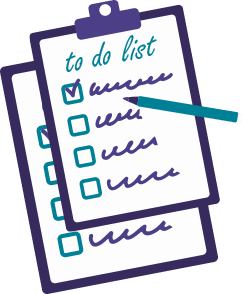

Related Articles
Related Articles
Time Management
Explore More
Customer Service Training
Dealing With Customers Online
Business Phone Etiquette
Handling Customer Complaints
Workplace Health And Safety
Learner Engagement
Prevent Customer Churn
Customer Satisfaction
Sales Training
So – you want to develop good time management skills, but don’t know how to get started?
Create a To Do list.
There are many tools out there to help you organise your tasks. Your organisation may request that you use a particular one. If that’s the case, you should review the onboarding material and be sure you understand how to use that particular tool properly. For our purposes we’re going to assume you’re using an old fashioned, but simple and effective method of writing a To Do list each day on a piece of paper.
You can create more than one list to help organise yourself. In fact, you can create as many lists as you like, but take care not to create too many or you will become overwhelmed and lose focus.
We suggest no more than two or three and to be clear what the purpose of each list is. Perhaps having multiple lists works best for you – that’s fine. The important thing is to make one daily To Do list. Write down what you wish to accomplish today. By creating this list, you’re setting yourself a list of targets to achieve. These targets should be achievable: they are tasks you need to do, not vague goals you wish to achieve.

Do not write broad goals on your daily To Do list.
Stick to tasks that need to be completed.
Many people spend their entire working day responding to emails, and at the end of the day find they still haven’t completed the task they set for themselves at the start of the day.
Start by writing down what you have to do – you can then add other items that you want to do to the list as well. You can write a separate goal list. Often this is useful, but on your daily To Do list, you need to break down the tasks that need to be done today to achieve your goals.
Tasks and goals are two separate things – be careful not to mix them up. Your daily To Do list should also list tasks in order of priority.
You should revise your daily To Do list at the end of each day and cross off each item that was completed. Crossing items off your list is important and helps to build a sense of satisfaction in completing your tasks. Any tasks that were not completed should be shifted to tomorrow’s To Do list.

Compile tomorrow's To Do list at the end of each day.
Of course, mobile phones and email aren’t the only distractions, being booked in endless meetings can also make it hard to focus.
This will help draw your attention to how well you are completing your tasks and will help you to reprioritise your approach to the next day. When you come into work the next morning, you already have a good idea of what’s on your daily To Do list.
Of course, each morning you should review this and see if anything has changed overnight, if any new tasks need to be added, or tasks need to be removed or reprioritised.
Regular reviews of your To Do list will help you keep track of your progress and help keep you focused.
Don’t make your daily To Do list too long. You won’t be able to do everything every day. To build strong time management skills make your daily task list a realistic list of what you need to achieve that day. Create a longer-term goal list to keep track of your broader, longer-term goals.

For more information about how to develop good Time Management techniques check out our short, practical, easy to understand training videos.
Most Popular Blogs













Published by Canity